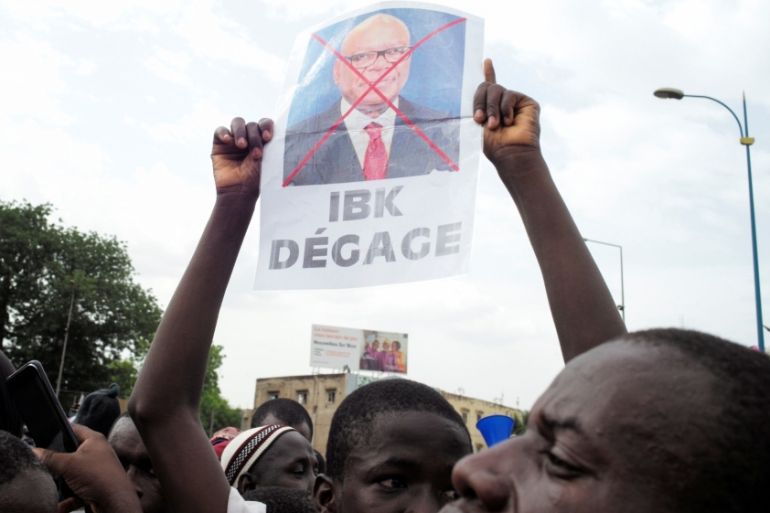Anti-gov’t protests resume in Mali after weeks-long pause
Demonstrators are calling for the resignation of President President Ibrahim Boubacar Keita as mediation stalls.

Opposition supporters have again taken to the streets of Mali’s capital to demand the resignation of President Ibrahim Boubacar Keita, ignoring pleas from regional mediators trying to defuse a deepening political crisis to stay home.
Thousands of protesters took to Bamako’s Independence Square on Tuesday, blowing vuvuzela horns and carrying placards bearing anti-government slogans such as, “We want real change in Mali, IBK [Ibrahim Boubacar Keita] out”.
The so-called June 5 Movement – a disparate alliance of political, social and civil-society groups that has staged at least two mass anti-government rallies before – has for weeks stuck to its core demand for Keita’s departure.
Although dissatisfaction over Mali’s financial troubles, corruption and worsening security situation has been simmering for a while, the spark for the current crisis was a decision by the Constitutional Court in April to overturn the results of parliamentary polls for 31 seats, in a move that saw candidates with Keita’s party get re-elected.
The protests turned violent on July 10 when at least 11 people were killed in clashes between security forces and protesters in the worst political strife Mali has seen in years.
Tuesday’s demonstration, the first after a temporary truce was announced last month before the Eid festival, went forward despite pleas from Goodluck Jonathan, the mediator for Mali’s crisis for the Economic Community of West African states (ECOWAS).
“Demonstrations do not solve problems per se,” Jonathan, a former Nigerian president, told a news conference on Monday evening, adding that opposition figures needed to enter a dialogue.
“Encouraging more demonstrations is just exposing young people to big risk,” he said. “People could die in the process.”
Proposals rejected
The 15-nation ECOWAS bloc has previously sent a high-level mission to the country and suggested several proposals for mediation, including the formation of a new unity government.
The bloc has remained supportive of Keita staying in office.
But the June 5 Movement, which is led, in part, by influential Muslim cleric Mahmoud Dicko, has so far rejected those proposals.
|
|
On Monday, Keita, who first came to power in 2013, swore in nine new judges to the Constitutional Court, part of an ECOWAS suggestion for resolving the dispute.
Al Jazeera’s Nicolas Haque, who has reported extensively on Mali, noted that the new judges had been nominated by a Keita ally.
“Absent [from Monday’s swearing-in ceremony] were the June 5 Movement and their leaders, who were not involved in the decision on who these judges will be,” said Haque.
The appointments, he said, added “fuel to the fire in this feeling amongst protesters that Keita is abusing power by bringing allies close to him”.
Devolving security situation
The increasing mediation efforts by ECOWAS in Mali underscore that regional leaders are eager to avoid further instability in the country of some 20 million people.
Mali has been plagued by an eight-year conflict that began as a separatist movement in the north but soon devolved into a multitude of armed groups jockeying for control in the country’s central region.
The insecurity has spilled into neighbouring Burkina Faso and Niger, with groups exploiting the poverty of marginalised communities and inflaming tensions between ethnic groups.
Attacks grew fivefold between 2016 and 2020, with 4,000 people killed in the three countries last year, up from about 770 in 2016, according to the United Nations.
|
|
The fighting has also forced hundreds of thousands of people from their homes and led to the closure of thousands of schools.
In central Mali, the presence of a massive UN peacekeeping mission, and other foreign troops, has failed to stem the violence, while allegations of abuses and extrajudicial killings by Malian forces have further perpetuated deep-rooted mistrust and enmity in parts of the country with little government presence otherwise.